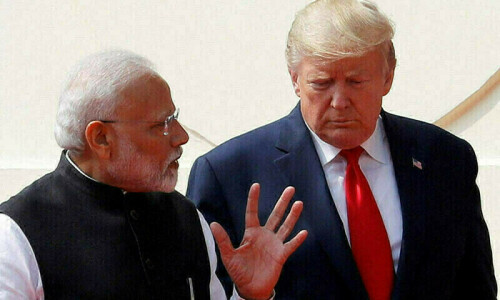
• President Zardari swears in chief justice; PM, CMs, services chiefs attend oath-taking ceremony
• New top judge summons meetings of full court, SJC
• Issues order to expand live-stream service
ISLAMABAD: Justice Yahya Afridi was sworn in by President Asif Ali Zardari as the 30th chief justice of Pakistan (CJP) on Saturday.
As his first action after taking oath as the top judge, CJP Afridi reconstituted the three-judge committee — which forms benches to hear cases — bringing back Justice Munib Akhtar to be part of it. The committee, headed by the chief justice, already has senior puisne judge Justice Syed Mansoor Ali Shah in it.
Earlier, President Asif Ali Zardari administered the oath to CJP Afridi at a ceremony also attended by Prime Minister Shehbaz Sharif, the three services chiefs, Senate Chairman Syed Yousaf Raza Gillani, National Assembly Speaker Ayaz Sadiq, federal ministers, provincial governors and chief ministers, judges of Supreme Court and high courts, former chief justices, law officers, and lawyer bodies’ representatives.
The new chief justice was presented a guard of honour by the police upon reaching the apex court after the oath-taking ceremony.
Three-judge committee Justice Afridi became the chief justice under the new constitutional order that came into place after parliament passed the 26th Constitutional Amendment last week.
The legislation, which brought major changes to the country’s judicial structure, scrapped the previous process of appointing chief justices, where the senior-most judge automatically took the post when the incumbent retired.
After the amendment, a parliamentary committee picks the chief justice from a panel of three senior-most judges of the Supreme Court.
CJP Afridi was third on the list when he was appointed the chief justice, bypassing Justice Akhtar and the senior-most judge, Justice Shah.
The constitution of the three-judge committee, as done by the new CJP, is being seen as a significant move as it was this issue which led to the acrimony between the SC judges and former CJP Qazi Faez Isa.
The committee was mandated by the Supreme Court (Practice and Procedure) Act, 2023 and comprises the chief justice and the next two senior-most judges.
However, last month, President Zardari signed off an ordinance that amended the law to give the CJP powers to nominate the third judge to join him and the senior puisne judge on the committee.
Legal observers believe the change was made to give CJP the authority he had over the formation of benches. In the lead-up to the ordinance, the ex-CJP seemed to be in the minority, with justices Shah and Akhtar disagreeing with him during the committee’s meeting.
After the amendment, ex-CJP Isa removed Justice Akhtar and added Justice Aminuddin Khan — the fourth senior-most judge — to the committee.
An office order issued by Supreme Court Registrar Jazeela Aslam on Saturday stated that the committee was constituted with the addition of Justice Akhtar.
The three-judge committee constituted seven benches to hear cases in the coming week.
The first bench will comprise CJP Afridi and Justice Shahid Bilal Hassan.
Justices Akhtar and Athar Minallah have been included in the second bench; justices Aminud Din Khan and Irfan Saadat Khan in the third bench; justices Jamal Khan Mandokhail, Musarrat Hilali and Malik Shahzad Ahmed Khan in the fourth bench; justices Muhammad Ali Mazhar and Syed Hassan Azhar Rizvi in the fifth bench; justices Ayesha A. Malik and Aqeel Ahmed Abbasi in the sixth bench; and justices Shahid Waheed and Naeem Akhtar Afghan in the seventh bench.
Ad hoc justices Sardar Tariq Masood and Mazhar Alam Miankhel have been included in the eighth bench.
Live streaming
CJP Afridi called a full court meeting — to be attended by all available judges — at 1pm on Monday.
He has also called a meeting of administrative judges of the Anti-Terrorism Courts along with progress reports on Nov 7.
A meeting of the Supreme Judicial Council will take place on Nov 8.
Besides, CJP Afridi ordered the SC staff to extend the facility of live streaming service to all courtrooms. Introduced by former CJP Isa, the facility was only available in Courtroom No. 1 where the top judge presides over the proceedings.
However, the broadcast will remain conditional, requiring consent from all parties involved in the case, including specific consent of a female petitioner to maintain her confidentiality.
A committee has been working on a proposal for the equipment and logistics required for this expansion. Their proposal will be reviewed and approved by the chief justice.
Published in Dawn, October 27th, 2024
















































Dear visitor, the comments section is undergoing an overhaul and will return soon.